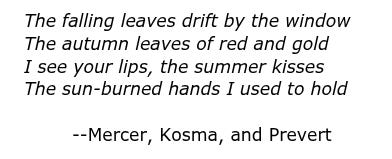Turn Turn Turn
War. Tariffs. Communism. And paper money, too. Why do we have public policies that are almost certain to be harmful? Are they like death – inescapable?
Friday, October 17th, 2025
Bill Bonner, from Madison, Connecticut
We drove up to Connecticut yesterday to attend a funeral. The leaves are still green in Maryland. Here they are bright yellow and gold. The autumn colors have not reached their peak, but it is still impressively bright.
“To everything there is a season,” said the presiding minister at the Congregationalist church, reading from Ecclesiastes, “and a time for every purpose under Heaven.”
There is a time to be born. And a time to die. Were it not so, it would be a very different world.
Our world is what it is. It is bound by iron laws. That which is born, must die. There’s no arguing about it. But in between birth and death there is a lot of room for mischief.
So, let’s take a look at some of the mischief. CNBC:
From bananas to toys...costs have risen since Trump’s tariffs went into effect
As any thoughtful economist could have predicted, tariffs are causing price increases. So far, according to the CNBC analysts, they are showing up most markedly in bananas, coffee, televisions, toys, and jewelry. Each category may have different drivers, but tariffs figure largely in all of them.
CNBC continues:
Overall, Americans now face an average tariff rate of 17.4% — the highest since 1935 — an increase estimated to cost households an extra $2,300 in 2025, according to the Yale Budget Lab. (These estimates include tariffs imposed under the International Emergency Economic Powers Act, which remain in place while the court challenge is pending).
In our private lives, we make our choices and suffer the consequences. We don’t necessarily get what we want or what we expect, but we get what we deserve. In public life, on the other hand, we typically get what others want for us. Team Trump, for example, wants us to pay higher prices for imported goods.
And therein begins mischief on a whole different scale. Public policies rule. Some of them simply reflect common, vernacular customs that have been given a seal of approval by the government. Don’t drive too fast. Don’t kill anyone (unless the feds tell you to). Etc.
But public policies that interfere with the honest commerce and peacefui pursuits of ‘the people’ invariably make things worse. As we’ve seen, the greater the interference, the less real progress people are able to make.
And today, we take up the question you haven’t asked. Why do we do this to ourselves, with policies that we know are likely to lead to misery and poverty?
Take war, for example. There is a time for war…and a time for peace. War seems to be a fact of life. Even 2,025 years after the Prince of Peace, war is still ‘a thing’...and becoming even more popular. The White House has retitled the Department of Defense as the Department of War. It has also urged European nations to spend more of their resources on preparation for war. And its own military/spook complex sends warships to blow up boats in the Caribbean and makes plans for murdering people in Venezuela.
Any sober observer, looking over the history of war, perhaps like General George G. Meade, walking the field of Gettysburg before the dead were gathered up, would conclude that war is a losing proposition.
And look at Europe. Countless wars have taken place. But what really changed? The French are still French, with their 265 different cheeses...the Germans are still Germans, with their 7,000 different beers. Europe’s most costly war — World War One — was begun for no particular reason...continued only because it had begun...and ended only when Germany was too exhausted to continue. What was the point? No one knows.
War is the most destructive and most dramatic public policy, but there are plenty of others.
Donald Trump says New York mayoral candidate Mamdani is a ‘communist.’ No, Mamdani replies, he’s a ‘democratic socialist.’ Whatever he calls himself, many of his policies are sure to do harm. Associated Press:
Mamdani does favor raising taxes on the wealthy to fund proposals he argues would make the city more affordable. That includes free bus service, universal childcare, and his signature issue: a freeze on rent increases for the city’s 1 million rent-regulated apartments. Opponents say a rent freeze would harm landlords, who have also been hit hard by inflation.
Perhaps nowhere has the “communist” label come up more than in relation to Mamdani’s proposal to set up a pilot program for city-run grocery stores. Billionaire John Catsimatidis, who owns grocery chains Gristedes and D’Agostino Supermarkets, said the program would “drag us down a path toward the bread lines of the old Soviet Union.”
War. Tariffs. Communism. And paper money, too. Why do we have public policies that are almost certain to be harmful? Are they like death – inescapable?
Tune in next week for the provocative answer.
Regards,
Bill Bonner




Whether it be tariffs and price floors or taxing the rich and City run grocery stores, both parties ignore Reagan’s timeless message: Government is the problem, not the solution.
" Why do we have public policies that are almost certain to be harmful"?
-
Because the only intellectual criteria required to vote is the ability to hold a crayon.